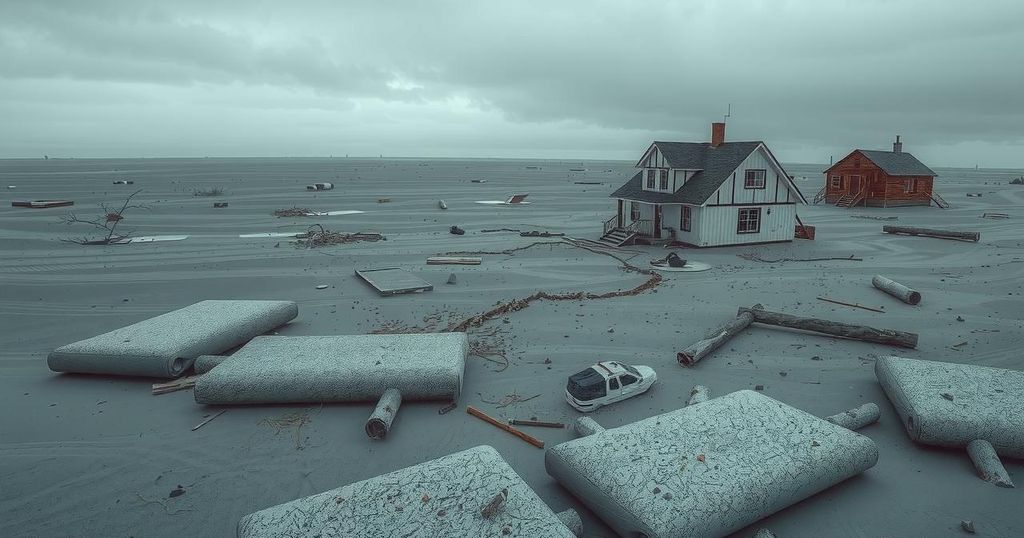Residents of Niger Communities Struggle with Stench from Decaying Corpses After Devastating Floods
Residents in Mokwa, Niger State, struggle with a horrific odor from decaying corpses in the aftermath of floods that killed around 200 and displaced thousands. A response involving government aid has begun, but community members call for urgent action to address health risks and recovery efforts.
Nearly two weeks after catastrophic floods hit the Mokwa Local Government Area in Niger State, residents are expressing their dismay over an overwhelming stench believed to be coming from decomposing corpses. Many locals are raising alarms about potential health hazards as the unpleasant odor persists, serving as a grim reminder of the disaster. The flood, which occurred on May 28 and 29, claimed approximately 200 lives and has had devastating effects on the community.
According to the Niger State Emergency Management Agency (NSEMA), the floods displaced over 3,000 individuals and washed away more than 50 homes. Official reports indicate that 161 corpses have been recovered, although many remain buried under dirt and debris. In recent days, residents have been uncovering bodies as they sift through the aftermath, compounding their grief and struggle.
Esther Nwanosike, a local who sells food from a makeshift shop, described the stench as unbearable, particularly when the wind blows. “My customers are complaining about it. They said they could not breathe well because of the stench,” she explained. Nwanosike believes that unburied corpses and the remnants of the flood’s devastation are to blame. She urged the government to take swift action, suggesting that fumigation might be necessary to alleviate the issue.
Alhassan Kolo, another resident, shared his distress over the near-unrecognizable state of some recovered bodies due to decay. “As we dig through the sand, we discover property and corpses,” he lamented. Fellow resident, Ahmed Yusuf, echoed concerns about the smell, asserting that it originates from unidentified casualties. He called for prompt government intervention, noting that many residents have lost loved ones who still remain missing.
Additionally, Salihu Ishaq reflected on the overwhelming devastation, recounting how he has missed a sister and her three children lost to the flood. Ishaq and others voiced the sentiment that many do not want to dwell in government-established camps for internally displaced persons, further highlighting their desire to return home amidst the crisis.
In response to the disaster, Vice President Kashim Shettima recently announced a ₦2 billion donation aimed at supporting recovery efforts, alongside food and urgent necessities for victims. The state government has pledged ₦1 billion for rehabilitation as well. Yet, for many residents like Amina Abubakar, who lost her sister and three children, this aid is critical; the need for more support is apparent and urgent.
Idris Ibrahim, the Director of Public Health in the Ministry of Secondary and Tertiary Health, assured that the government is aware of the problems residents are facing, including the stench. He mentioned that a control team has been deployed to deal with the matter. Ibrahim confirmed that a plan is in place to address residents’ needs as discussions about possible relocation continue.
On June 4, NSEMA Director General Abdullahi Baba-Arah updated the public that the death toll has reached 161, following one recent recovery. Meanwhile, in an effort to clarify the odor situation, NEMA spokesman Manzo Ezekiel pointed out that the stench arises from a combination of decomposing bodies and human waste exposed by the floodwaters, complicating the community’s living conditions.
Niger State Governor, Mohammed Bago, attributed the floodwaters in part to external sources, possibly from neighboring Niger Republic, during a condolence visit from Borno State Governor Babagana Zulum. He emphasized the necessity for community advocacy to protect residents living on flood-prone coastlines.
The Mokwa community is reeling from the aftermath of devastating floods, which resulted in significant loss of life and displacement. Residents are enduring a pungent stench arising from decaying corpses and sanitation issues, prompting urgent calls for government intervention. Amid ongoing recovery efforts, including financial aid from both state and federal sources, the affected population is left seeking resolution to their dire circumstances, both for immediate relief and long-term recovery. As health concerns grow, local authorities are urged to act swiftly.
Original Source: punchng.com




Post Comment